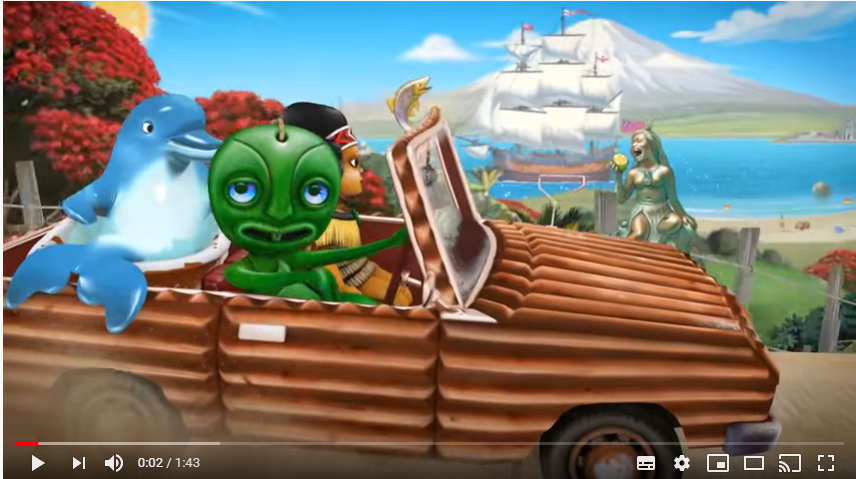This article discusses the inappropriate and satirical usage of Māori religious icons and racial stereotypes of Māori in the Tasti bar advert that TVNZ recently played on air. The advert is also online here.
UPDATE: Tasti apologise and state they will remove the advert. Their media statement here.
The advert promotes racism and discrimination against Māori and their customary religious beliefs.
I would encourage you to make a complaint to the Advertising Standards Authority using the information below on their online form. I have lodged a complaint already, but I think more the better.

Tiki the deity of fertility is driving a car. Tiki is widely recognised as a deity among Māori and Pacific Islands. Any other such satirical use of a non Māori religious icon would not be allowed on TV. There have been many instances of violent backlashes and artists going to jail around the world for doing such things. One case, a Kiwi created a design of Buddha with headphones in Maynmar and was sent to prison.
It could be argued that Tiki was once an icon in New Zealand that was culturally appropriated, but Māori have fought hard for decades to educate and change this colonial behavior.
Pania, often referred to as Pania of the Reef, is a famous statute which is an ancestor. She is seen with her mouth wide open eating something which I think is very disrespectful to her whānau and Iwi. It also carries a number of negative stereotypes.
Tama Nui Te Ra (Sun) is the god of the Sun. He has what looks like an artists impression of Maui catching him. It is a tapu/noa issue that he is being associated with food and is irrelevant to Tasti and food.
I assume the mountain is Taranaki, 1.43 into the clip, Taranaki is covered in Kiwifruit, degrading the mana of Taranaki. This is another tapu/noa situation. In the Waitangi Tribunal – Wai 143 describes the sacredness of Taranaki and reverting the name back from Egmont to Taranaki.
Again, why have sacred images of ancestors and deities in a satirical advert advertising food that will likely contribute to the negative health stats of Māori. There are more appropriate Kiwiana than religious items and peoples ancestors.
Māori are being portrayed as cannibals with an English sailor (Captain Cook) being cooked over a fire. Captain Cook was killed in Hawaii during a fight and was not eaten. Modern day research has proven this to a a racist stereotype. Cannibalism did occur with pre colonial Māori, but it was always surrounded by strict customs and religious rites. This image just perpetuates the racist attitude that Māori ate Pākehā.

More bizarre is the fact that the Māori are referenced as Ten Guitars. Another colonial stereotype that all Māori play guitars and particularly this song. But then also being entertained with cooking an English sailor over a fire is despicable.
Another colonial stereotype is Māori men playing guitars dressed in a bad attempt at traditional clothing and moko, depicts the men as overweight. Research and history proves Māori pre colonial interventions were very fit, muscular people. The image perpetuates a racist myth that Māori are overweight.
In the car is another racist symbol – A penguin dressed as a Native Alaskan or Inuit, often racially referred to as an Eskimo. This image is in bad taste and another example of a by gone era of racist colonial figures. I would hardly call this kiwiana at any stretch of the mind.
Near the end is a depiction of what the advert credits refer to as “Whale Rider” from the movie. The movie was based on traditions and local ancestors. From the movie, this advert depicts Ngati Porou primary ancestor Paikea. In the advert Paikea is depicted as a horse. If based on traditional stories, then the advert is depicting the ancestor Kae as a horse. A very hurtful insult to Maori and Iwi who identify with Paikea and Kae.
Tinirau is the whale in traditional stories. As a strong, powerful and clever navigator, he would not run away and beach himself due to a whaling ship. Again, very disrespectful.

How does a New Zealand company be so culturally ignorant and offensive and not realise it? A simple user group interview or a cultural consultant would have quickly identified the issues. The advert had the potential to be a great kiwi icon that will now be remembered for something it was not intended to be.


Leave a Reply
You must be logged in to post a comment.